Watch Dogs' hero is a lovable loser, and I'm a low-rent super villain
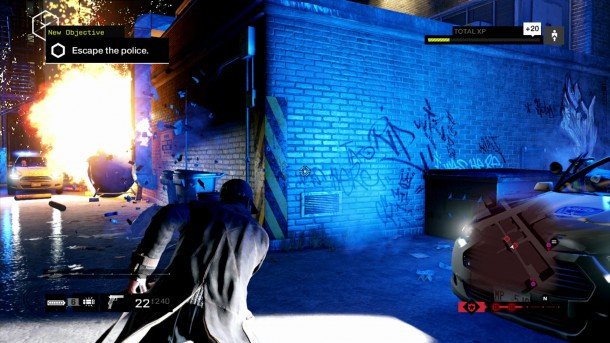
I keep pausing at doors, fumbling with the controller to find the “open” button. Watch Dogs' world is better than that. I remind myself to just walk through the door, and borderline-schlubby hero Aiden Pearce pushes it open and steps into a dingy pawn shop, all shrouded in darkness until his eyes adjust to the dim bulbs. I walk out, then back in, untraining myself to stop and wait for a loading screen.
Watch Dogs' near-future Chicago feels incredibly real, indoors and out. It's dense, full of debris, full of life. It feels a lot more like a city than the playgrounds of GTA and Saints Row, and I said the same after I played the high-tech crime drama in Montreal last year (just before it was delayed). After four more hours of play at an event in San Francisco last week (which was PS4 only, I'm afraid), I still think so, though it's exposed more of its flaws now.
The pedestrians have dumb mouths, for instance. Standing in one spot, I heard the same conversation three times in a row, the same voices miraculously coming out of different pairs of pedestrians. I rode a motorcycle by the curb at all of five miles per hour and someone on the sidewalk flipped out and called me crazy. The pedestrians are very stupid, and that's disappointing in a Chicago that's otherwise intricately simulated. But far more damaging to my suspension of disbelief is how many of them I kill.
How I terrorized Chicago
When I'm put into a system, I can't help but want to test the rules, to see how far I can go in any one direction. So, I pull out my gun and unload it into a group of pedestrians. It feels a bit horrific in such a well-realized city, but I can do it, so I do it. The police take me down, and I reappear where I was with my reputation meter reduced to "hoodlum." There's no restraint to the violence outside a meter that represents your public image (oh no, a meter !), so outside of missions and side missions, Watch Dogs is GTA: a big city where you can steal cars, drive recklessly, kill pedestrians, kill police, and suffer no consequences.
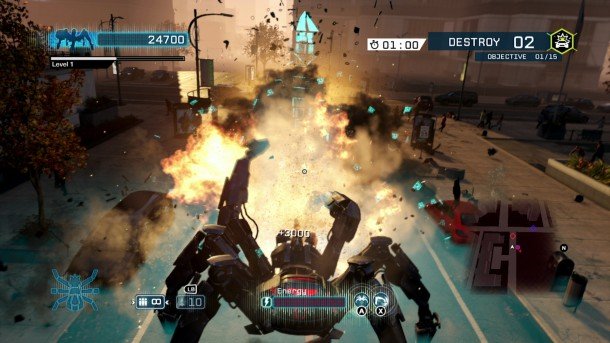
Aiden Pearce doesn't seem like someone who'd use the city as a playground for indiscriminate violence, but Watch Dogs tries to have it both ways. On one hand it addresses the perils of vigilantism and the surveillance state with tricky decisions and characters who I think we'll come to like a lot, and on the other it offers a Saints Row-style death and destruction bonus mode with a spider tank. It struggles to be both at once: I felt like I was playing two games, one as Aiden, and one as a crappy Spider-Man villain.
For sure, though, being a crappy Spider-Man villain kicks ass. I love driving muscle cars around Chicago, barreling into lesser vehicles, zapping traffic lights to cause crashes, sticking up gun shops, shooting criminals in their backs before they can even commit a crime, and casually wandering around bursting underground steam pipes. (They erupt through the pavement, launching cars into massive plumes of superheated water, and it's glorious.)
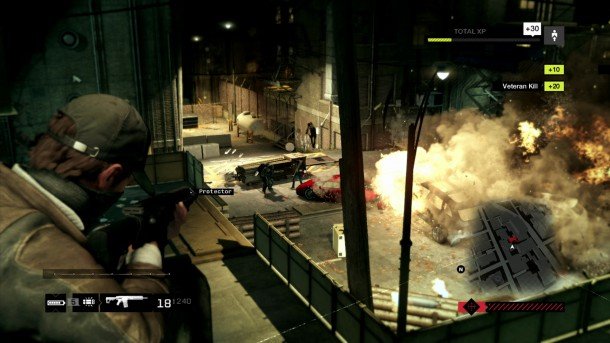
Life gets even worse for the residents of Chicago when, teleported to a later part of the game, I discover that Aiden's blackout gadget is my favorite thing ever. It does what it says, cutting the power to the city so I can drive around waiting for the awesome moment when all the lights flick back on—I do it over and over just because of how cool that looks. I also spend a full minute raising and lowering concrete blockers under a small car, watching the driver freak out as I give him the hydraulics experience, eventually flipping the car over. Being a dick is fun.
Keep up to date with the most important stories and the best deals, as picked by the PC Gamer team.
Being Aiden Pearce
Aiden Pearce is kind of a dick, too, but the biggest surprise of the demo is how much I like Watch Dogs' protagonist. I like him more than the low-rent villain I spent so much time playing as. Though he mopes and rasps like Batman, he doesn't have the chiseled jaw of your vanilla comic book hero, and really, he's kind of a loser.
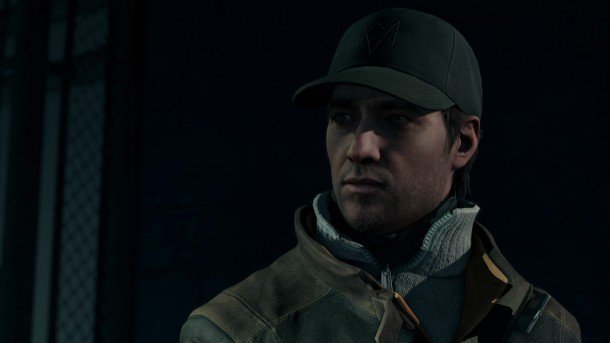
Aiden's a not-quite-reformed criminal who lives to protect his sister and nephew while taking bloody revenge on the rival somebodies who killed his niece (she was in his car, someone shot out a tire, it crashed, she died, very tragic). He seems to like his cool, distant, hardened-by-the-world persona, even though it got his niece killed and he's a bit too old to be running around in a leather trench coat, living in a motel and fancying himself a badass. It's kind of sad, but charmingly sad. Aiden is that guy who watches Lock, Stock and Two Smoking Barrels every weekend and wishes it were real life. Kind of dopey, not anyone I'd peg as a hardboiled criminal. I want to pinch his dumb cheeks, except he has a gun and no big qualms with using it.
His hired sidekick, Jordi, is even better. In the few brief scenes I saw with him, he effortlessly became my most anticipated part of the game. Jordi could be the funniest, best-acted character Ubisoft has ever created. There's generally a sense of humor to Watch Dogs that surprised me. Outside of the intro cinematic, in which someone actually says "this guy's hacking days are done," the writing is smart and funny—it's a game story I look forward to, which is rare.
Having it all
One concern is just how much Watch Dogs tries to do—it's like a restaurant with a 20 page menu, where you know that at least the fish dishes are a gamble. There are cars, guns, hacking, gadgets, crafting, skill trees, story missions, side missions of every variety, minigames, several multiplayer modes, and on, and on. The world is dangerously cluttered with hackable stuff too: I was trying to hack a someone's phone and blew him up because I accidentally hacked the circuit box next to him. Justice is blind, and an arsonist.
It's very Ubisoft game design: an open world where there's a marker every five feet with something to do. I was disappointed to find that the main missions stick to the familiar fail, start over, trial-and-error until you succeed structure, but I generally had a lot of fun being Aiden, even the reckless, "somebody stop him!" version of Aiden I mostly played as.
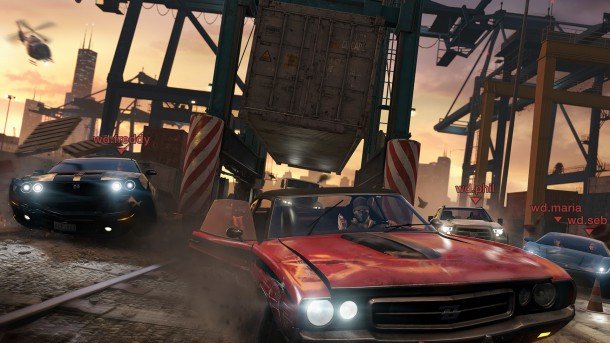
In side missions, I identified potential crimes and creeped in to intervene, but kept blowing my cover and spooking the criminals before I could witness a crime. I shot them anyway. Justice! In another side mission, I raced cars to check points against the clock, at one point driving a motorcycle through a glass window to shave off a few seconds. Justice! I guess. And that barely begins to cover all the things to do in Chicago.
I just worry that I'll get tired of being Aiden too quickly. He's loveable, but he's also a loser. After five hours of playing, I was more than ready to not be him anymore, to stop chasing down and beating people, to stop getting into gun fights all the time. It's a little exhausting, and all his bravado really kills my suspension of disbelief. Watch Dogs' Chicago feels like an invention of Aiden's mind, a place where he can live out his action movie revenge fantasies without consequence. Maybe the car accident was his fault all along and he's coping by pretending he's a whip smart vigilante. Oh, poor Aiden, constantly imagining car chases and bloody shootouts while he wanders around looking at his smart phone.
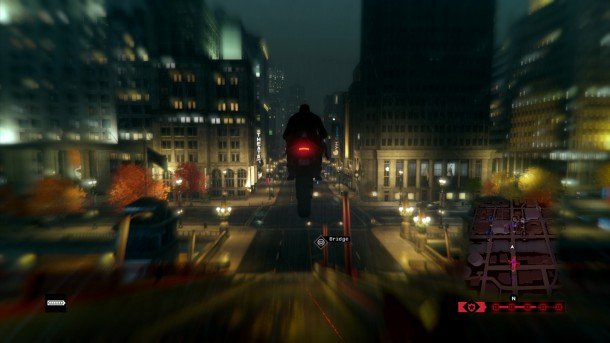
I admit I'm getting a bit curmudgeonly—I mean, the highlight of my demo was visiting Aiden's sister (it just seems like something a real person would do, OK?) Even that ended with a car chase, though, so clearly Aiden's dream world doesn't let him be a real person for long. It's good then, that the car chases are fun—fast, destructive, and with a satisfying conclusion where I chase the guy down on foot and beat him with a night stick.
As long as the story gives me enough motivation (threaten my sister? I have three sisters, I can relate to that, and now I'm in a world where I have unlimited judicial power, so careful there buddy), Aiden's goofy revenge fantasies might become my own. Or I'll just be rampaging around like a villainous maniac, which is fun in its own way, but a little less fulfilling.
Disclosure amendment: At the time I wrote this article, I was in a relationship with an employee of Ubisoft.

Tyler grew up in Silicon Valley during the '80s and '90s, playing games like Zork and Arkanoid on early PCs. He was later captivated by Myst, SimCity, Civilization, Command & Conquer, all the shooters they call "boomer shooters" now, and PS1 classic Bushido Blade (that's right: he had Bleem!). Tyler joined PC Gamer in 2011, and today he's focused on the site's news coverage. His hobbies include amateur boxing and adding to his 1,200-plus hours in Rocket League.

